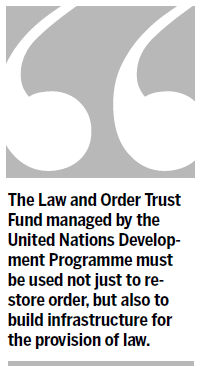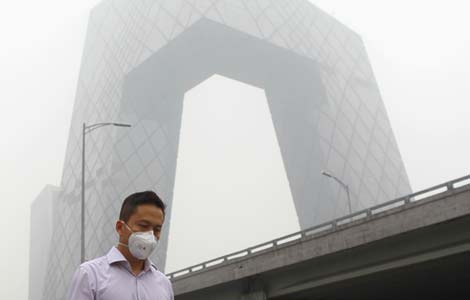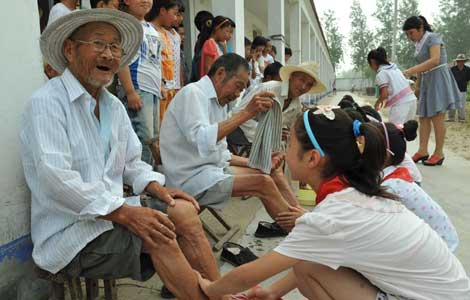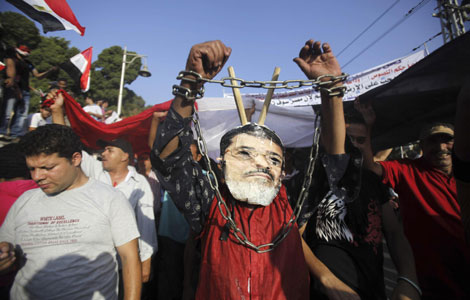Afghan security lies in development
Updated: 2013-07-02 08:05
By Ajay Chhibber (China Daily)
|
||||||||

The United States' recent announcement of holding direct talks with the Taliban and the subsequent reaction of Afghan President Hamid Karzai once again put Afghanistan's future in the spotlight.
There is intense interest in security, and talks about security. Equally important are issues of how to improve people's livelihoods and basic services such as water, roads, electricity, justice and the rule of law. These issues will determine how Afghan people react to the changing political and security landscape.
Despite the gloom and doom news, Afghanistan has thrown up many positives. More than 2 million children, including girls, regularly attend school. Connectivity has improved with more than 14 million cell phone users. Budgetary systems are improving at the national and municipal levels, which will ensure better accountability and delivery of public services. Yet huge challenges remain.
Challenge one: Efforts to improve the infrastructure and functions of local governments must be accelerated. In the decade between the two Bonn conferences on Afghanistan, much was done to build national institutions in the country. When it came to building local governments, however, donor impatience led to short cuts.
Each donor selected a province to set up its own provincial reconstruction team (PRT) and deliver assistance. The hard slog to build effective local governments seemed time consuming and difficult, and not sufficiently visible to legislatures and people back home. Setting up a PRT with visible results - even if it meant undermining local government capacity - was much easier.
Now as US-led NATO troops withdraw from the Afghanistan we're dealing with the same issue - which was avoided by setting up PRTs - namely, the rebuilding of local government infrastructure without which delivery of services is not possible.
Challenge two: The fear of a sharp drop in aid after 2014 deserves special attention. But even current levels of promised assistance are not flowing through. A mutual accountability pact made in Tokyo pledged about $4 billion a year in assistance to Afghanistan, but less than 50 percent of that has been delivered.
Part of the problem is lack of expertise at the local level to efficiently use this assistance, which will require a buildup of local government. A related issue is that the excess of experienced personnel in key ministries and departments - built up by offering high salaries to attract and retain talent - has created a parallel civil service. The challenge is how to dismantle this parallel structure to create a sustainable Afghan-led civil service, while retaining talented people.
Challenge three: There is a need to create employment for a young and rapidly growing population - especially people between the ages of 18 to 25. A majority of Afghanistan's population depends on agriculture, and revitalizing agricultural growth remains the largest source of job creation and improving livelihoods.
In the past, significant emphasis was placed on providing inputs such as irrigation, fertilizer and seeds. Not enough focus has been given to understanding the supply chain, encouraging agro-processing and finding markets for agricultural products.
Much attention has turned to Afghanistan's mining potential. Afghanistan's efforts to develop a mining law and an investment framework have been progressing, but developing mining takes time and huge investments will take place only when peace is established.
Afghanistan could also consider a cash-for-work scheme focused on road maintenance, reforestation and basic urban and municipal infrastructure. Schemes for the youth, focused on skills training, sports and civic culture are also crucial.
Kabul is the fastest growing city in the world as refugees return from abroad and people migrate from the countryside to the capital. Given the lack of well-established property rights and insufficient services, there remains a large, vulnerable population that shuffles around the city, creating a huge challenge for the government and a sense of insecurity. Without jobs no security is possible.
Challenge four: Heavy emphasis has been laid on building and strengthening Afghanistan's security forces but not enough attention has been paid to justice and the rule of law. This leaves a vacuum - especially in remote areas.
The Taliban have gained acceptability in some parts of the country by providing a sort of rough and ready justice. If people are to reject the Taliban, they must experience an alternative that is credible, predictable and fair under the rule of law.
The Law and Order Trust Fund managed by the United Nations Development Programme must be used not just to restore order, but also to build infrastructure for the provision of law.
Challenge five: A visible and vital symbol of a credible transition will be the 2014 presidential elections, and subsequent parliamentary and local elections. People will want to see an electoral system that can deliver a reasonably clean election and withstand the tests it will face. Women's ability to vote and play an equal part in politics will be carefully watched.
The UN is working closely with the Independent Election Commission to develop such a system - but as the political maneuverings intensify with the elections getting closer, a united international community must be prepared to provide financial assistance and ensure that the key players honor their commitments for a free and fair election.
A landlocked country, Afghanistan has prospered when it acted as a bridge across regions - with China and Central Asia to the North and East, with India and Pakistan to the South and with the Near East to its West. Therefore, regional cooperation must form a core of any strategy of economic development for Afghanistan.
With the prospects of improved India-Pakistan relations any trade agreement between them would be a huge boon for Afghanistan, because it would pave the way to the large and growing Indian market. It would also open up the possibility of the much-discussed TAPI (Turkmenistan-Afghanistan- Pakistan-India) energy corridor. Likewise, entry into Central Asia and China, along the Silk Road, offers Afghanistan huge trade potential.
If these challenges are overcome, we can see more progress in economic and social development, and a better framework for security too.
The author is UN assistant secretary-general, UNDP assistant administrator, and director of UNDP's Regional Bureau for Asia and the Pacific.
(China Daily USA 07/02/2013 page12)

 Egypt army gives Mursi 48 hours to share power
Egypt army gives Mursi 48 hours to share power
 No quick end in sight for Beijing smog
No quick end in sight for Beijing smog
 New filial law sparks debate
New filial law sparks debate
 Bakelants claims Tour de France second stage
Bakelants claims Tour de France second stage
 2013 BET Awards in Los Angeles
2013 BET Awards in Los Angeles
 Gay pride parade around the world
Gay pride parade around the world
 Four dead in Egypt clashes, scores wounded
Four dead in Egypt clashes, scores wounded
 New NSA spying allegations rile European allies
New NSA spying allegations rile European allies
Most Viewed
Editor's Picks

|

|

|

|

|

|
Today's Top News
Kerry hails China's denuclearization bid
19 firefighters killed in Arizona fire
Book reveals islands' true history
Tokyo warned not to resort to 'empty talk'
Snowden applies for Russian asylum
No quick end in sight for Beijing smog
New home prices defy curbs
Mandela 'still critical but stable'
US Weekly

|

|






